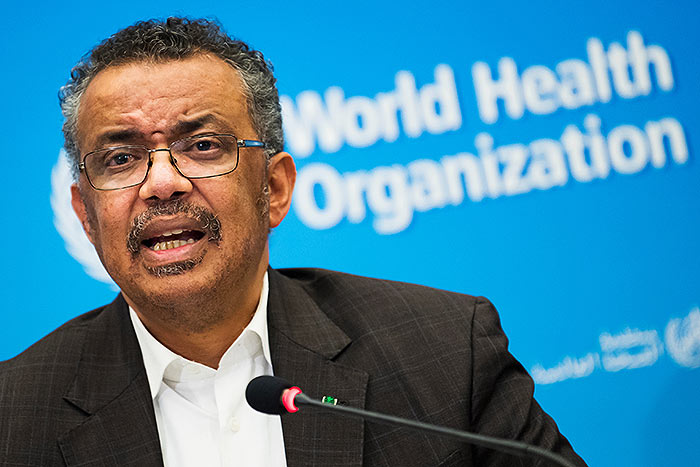Coronavirus declared global health emergency by WHO

The new coronavirus has been declared a global emergency by the World Health Organization, as the outbreak continues to spread outside China.
“The main reason for this declaration is not what is happening in China but what is happening in other countries,” said WHO chief Tedros Adhanom Ghebreyesus.
The concern is that it could spread to countries with weaker health systems.
At least 213 people have died from the virus in China.
The WHO said there had been 98 cases in 18 other countries, but no deaths. Most cases have emerged in people who have travelled from the Chinese city of Wuhan, where the outbreak began.
However, there have been eight cases of human-to-human infection – in Germany, Japan, Vietnam and the United States.
Speaking at a news conference in Geneva, Tedros described the virus as an “unprecedented outbreak” that has been met with an “unprecedented response”.
He praised the “extraordinary measures” Chinese authorities had taken to prevent it from spreading and said there was no reason to limit trade or travel to China, adding: “Let me be clear, this declaration is not a vote of no confidence in China”.
But various countries have taken steps to close borders or cancel flights in recent days, and companies like Google, Ikea, Starbucks and Tesla have closed their shops or stopped operations.
How unusual is this declaration?
The WHO declares a Public Health Emergency of International Concern when there is “an extraordinary event which is determined⦠to constitute a public health risk to other states through the international spread of disease”.
It has previously declared five global public health emergencies:
- Swine flu, 2009 -The H1N1 virus spread across the world in 2009, killing more than 200,000 people, and a public health emergency was called to ensure the world was carefully monitoring its spread and able to respond, including with vaccines.
- Polio, 2014 – Although closer than ever to eradication in 2012, polio numbers rose in 2013. An emergency was declared due to fears the global fight against its eradication could face a major setback.
- Zika, 2016 – The WHO declared Zika a public health emergency in 2016 after the disease spread rapidly through the Americas. Although for many Zika symptoms are mild, it can be dangerous for pregnant women and the emergency was called to spur urgent research.
- Ebola, 2014 and 2019 – The first emergency over the virus lasted from August 2014 to March 2016 as almost 30,000 people were infected and more than 11,000 died in West Africa. The WHO cited “the virulence of the virus, the intensive community and health facility transmission patterns, and the weak health systems” in affected countries. A second emergency was declared last year as an outbreak spread in DR Congo.
How is China handling the outbreak?
A confirmed case in Tibet means the virus has now reached every region in mainland China. According to the country’s National Health Commission, 9,692 cases have tested positive.
Although questions have been raised about transparency, the WHO has praised China’s handling of the outbreak. President Xi Jinping has vowed to defeat what he called a “devil” virus.
The central province of Hubei, where nearly all deaths have occurred, is in a state of lockdown. The province of 60 million people is home to Wuhan, the heart of the outbreak.
The city has effectively been sealed off and China has put numerous transport restrictions in place to curb the spread of the virus.
People who have been in Hubei are also being told by their employers to work from home until it is considered safe for them to return.
The virus is affecting China’s economy, the world’s second-largest, with a growing number of countries advising their citizens to avoid all non-essential travel to the country.
How is the world responding?
Voluntary evacuations of hundreds of foreign nationals from Wuhan are under way, and the UK, Australia, South Korea, Singapore and New Zealand are expected to quarantine all evacuees for two weeks to monitor them for symptoms and avoid any contagion.
Australia plans to quarantine its evacuees on Christmas Island, 2,000km (1,200 miles) from the mainland in a detention centre that has been used to house asylum seekers.
Countries with diagnosed cases have been keeping patients in isolation. recent developments:
- Italy suspended flights to China after two Chinese tourists in Rome were diagnosed with the virus; earlier 6,000 people on board a cruise ship were temporarily barred from disembarking after a Chinese passenger was suspected of having the virus but tests came back as negative
- In the US,Chicago health officials have reported the first US case of human-to-human transmission; and around 200 US citizens have been flown out of Wuhan and are being isolated at a Californian military base for at least 72 hours
- Russia has decided to close its 4,300km (2,670-mile) far-eastern border with China in an attempt to prevent contagion
- Flights to take British and South Korean citizens out of Wuhan have both been delayed, after relevant permissions from the Chinese authorities did not come through
- Two flights to Japan have already landed in Tokyo. Three passengers have so far tested positive for the virus, Japanese media report
- Two aircraft are due to fly EU citizens home, with 250 French nationals leaving on the first flight
- India has confirmed its first case of the virus – a student in the southern state of Kerala who was studying in Wuhan
(BBC)

Latest Headlines in Sri Lanka
- Sri Lanka revises fuel prices from April 1, 2025 March 31, 2025
- Laugfs Gas prices increased from April 1, 2025 March 31, 2025
- Organized criminal ‘Rotumba Amila’ arrested in Russia March 31, 2025
- Sri Lanka revamps Withholding Tax: Relief for low-income earners March 31, 2025
- Sri Lanka exports canned fish on a large scale for the first time March 31, 2025


